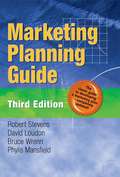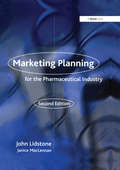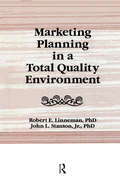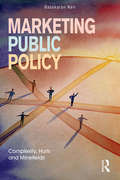- Table View
- List View
Marketing Planning & Strategy: A Practical Introduction
by John DawesIn marketing, one of the most practical things one can learn is how to create a sound marketing plan. Marketing Planning and Strategy guides concisely through the marketing planning process from start to finish, drawing on examples from large brands. It features a running case study about a small services business that breaks the marketing plan into easy-to- digestible chunks. A dedicated chapter on marketing strategy concepts will help one understand how they link to market, firm or decision-related factors. Self-test questions and scenarios with tasks throughout make for an active learning experience. This book will help the reader to develop their marketing decision-making by learning key skills such as how to do a SWOT analysis and how to budget and forecast correctly.
Marketing Planning & Strategy: A Practical Introduction
by John DawesWe know how eager you are to learn practical workplace skills at university so that you are "job ready" following graduation. In marketing, one of the most practical things you can learn how to do is create a sound marketing plan. This new book guides you concisely through the marketing planning process from start to finish, drawing on examples from large brands like Ikea and Krispy Kreme to digital start-ups like Starling Bank. Features a running case study about a small services business that breaks the marketing plan down into easy to digestible chunks. A dedicated chapter on marketing strategy concepts to help you understand how they link to market, firm or decision-related factors. Self-test questions and scenarios with tasks throughout make for an active learning experience. Practical in its step-by-step approach and inclusion of activities and scenarios and written simply whilst still underpinned by marketing strategy scholarship, this book will help you to develop your marketing decision-making throughout by learning key skills such as how to do a SWOT analysis and how to budget and forecast correctly. Supported by online resources for lecturers including PowerPoint slides, an instructor’s manual and a suggested syllabus. Suitable reading for marketing planning and marketing strategy courses.
Marketing Planning & Strategy: A Practical Introduction
by John DawesWe know how eager you are to learn practical workplace skills at university so that you are "job ready" following graduation. In marketing, one of the most practical things you can learn how to do is create a sound marketing plan. This new book guides you concisely through the marketing planning process from start to finish, drawing on examples from large brands like Ikea and Krispy Kreme to digital start-ups like Starling Bank. Features a running case study about a small services business that breaks the marketing plan down into easy to digestible chunks. A dedicated chapter on marketing strategy concepts to help you understand how they link to market, firm or decision-related factors. Self-test questions and scenarios with tasks throughout make for an active learning experience. Practical in its step-by-step approach and inclusion of activities and scenarios and written simply whilst still underpinned by marketing strategy scholarship, this book will help you to develop your marketing decision-making throughout by learning key skills such as how to do a SWOT analysis and how to budget and forecast correctly. Supported by online resources for lecturers including PowerPoint slides, an instructor’s manual and a suggested syllabus. Suitable reading for marketing planning and marketing strategy courses.
Marketing Planning Guide: A Guide To Developing A Strategic Marketing Plan (Haworth Marketing Resources Ser. #Vol. 2)
by Bruce Wrenn Phylis M MansfieldTHE CLASSIC guide to develop a marketing plan-completely updated! The newly revised Marketing Planning Guide, Third Edition is the step-by-step guide that gives you the tools to prepare an effective marketing plan for a company, product, or service. With over 50 pages of updated material, this classic textbook has the solid foundation of knowledge and philosophy of the previous editions while adding essential new information on Internet marketing, business ethics, and an illustrative sample business plan. Worksheets at the end of each chapter guide you in creating your own plan-once all the worksheets are completed you will have roughed out your own complete marketing plan. The accompanying instructor's package includes a helpful manual, a detailed sample course syllabus, and a test bank featuring a multiple-choice and true-false questions for each chapter with answers. This edition of the Marketing Planning Guide contains clear tables and diagrams, is fully referenced, and has updated examples for easy understanding of concepts. It shows how to: analyze the market, consumers, the competition, and opportunities develop strategy and marketing objectives make product, place, promotional, and price decisions realize the financial impact of marketing strategies implement, audit, and control your marketing planAnd now the Marketing Planning Guide, Third Edition is updated to include: extensive information on Internet marketing new examples illustrating the process a complete sample marketing plan end of chapter worksheets providing step-by-step instructions Internet data sourcesThis is the definitive book for marketing professionals who want to use a "hands on" approach for learning the planning process. It will guide anyone through the steps of preparing an effective marketing plan.
Marketing Planning for Services: A Complete Guide (Marketing Ser.)
by Adrian Payne Malcolm McDonaldMarketing Planning for Services is the answer to the challenge of creating marketing plans that produce significantly improved bottom-line results. It is written in a pragmatic, action-orientated style and each chapter has examples of marketing planning in practice. The authors highlight key misunderstandings about marketing and the nature of services and relationship marketing. The marketer is taken step-by-step through the key phases of the marketing planning process and alerted to the barriers that can prevent a service organisation being successful in introducing marketing planning. Practical frameworks and techniques are suggested for undertaking the marketing planning process and implementing the principles covered. The world renowned authors also tackle key organisational aspects relating to marketing planning which can have a profound impact on its ultimate effectiveness. These include: marketing intelligence systems; market research; organisation development stages; marketing orientation. Marketing Planning for Services is for marketers in the service sector and students of marketing.
Marketing Planning for the Pharmaceutical Industry
by Janice MacLennan John LidstoneMarketing in the pharmaceutical and healthcare sector requires a particular set of skills; its intricacies mean planning is an essential prerequisite. The marketing planning system described in this book has been designed to enable marketing and product executives to produce a plan which serves as a dynamic management tool which will help them to get from where they are now to where they want to be next year and thereafter. Now in its second edition, this bestselling book has become the standard text for all product managers, marketing managers and directors working in this demanding industry. John Lidstone and Janice MacLennan have updated the book to embrace best current practice. A new orientation to external analysis and a reworking of the application of SWOT analysis, along with fresh material on sales forecasting and strategy implementation, bring the book up to date with current thinking and industry trends. Marketing Planning for the Pharmaceutical Industry is based on real life experience built up over many years. Each chapter takes the reader through the sequential stages of planning so that by the end they will be able to produce a practical plan ready for implementation. It is the only book of this type which tailors marketing to those working in the sector and as such is a unique, invaluable and indispensable resource.
Marketing Planning in a Total Quality Environment
by William Winston John L Stanton Robert E LinnemanMarketing Planning in a Total Quality Environment is a how-to book designed for the marketing practitioner. It provides detailed information on how to prepare and implement a marketing plan based in a total quality environment.For the last twenty years, the authors, as marketing practitioners and educators, have been deeply involved in the planning processes of many corporations. This book, Marketing Planning in a Total Quality Environment, is the product of what they've learned over the years from working with these diverse corporations and their executives. The authors provide readers with each step in the total quality planning process, complete with check sheets and plan formats. After readers finish the book, they can prepare a quality-driven marketing plan that will be used and followed throughout the year--instead of becoming a shelf item.This book is for you and the many other marketing professionals who are faced with one or more of these situations:You're doing a good job, but you'd like to do even better.You're spending valuable time putting out fires. You lack time to do the things that need to be done.You're always having a hard time coordinating major marketing programs.You're faced with a major discrepancy between where you are and where you'd like to be; you've got a planning gap.You realize that you've got to offer your customers more quality if you're going to be competitive in the new market environment.You'd like to have a professional annual marketing plan--one that will be well received by management and will also keep you and your staff focused throughout the year.Because each step on how to develop a marketing plan is covered, Marketing Planning in a Total Quality Environment is ideal for presidents of smaller firms, marketing directors and planners, product managers, and planning specialists. The authors include a sample fact book which can be used to store and analyze data, planning forms which help convert data into information, and marketing plan formats which ensure that the plan will get used.
Marketing Plans
by Malcolm Mcdonald Hugh WilsonNow in its 7th edition, Marketing Plans is a highly renowned international bestseller. The book has been thoroughly revised, and every chapter has been carefully updated with special attention to the latest developments in marketing. To accomplish this, Professor Malcolm McDonald has been joined in this edition by Professor Hugh Wilson, a leading expert on CRM and multichannel strategy as well as marketing planning.Major changes to this edition include new chapters based on the very latest research on:Planning for integrated marketing communications and digital marketingDeveloping multichannel strategyDeveloping the CRM planMarketing effectiveness and accountabilityMarketing Plans is designed as a tool and a user-friendly learning, resource. Every point illustrated by powerful practical examples and made actionable through simple, step-by-step templates and exercises.The book is established as essential reading for all serious professional marketers and students of marketing, from undergraduate and postgraduate to professional courses for bodies such as CIM. Above all it provides a practical, hands-on guide to implementing every single concept included in the text."It is clearly and powerfully written and is probably the best book on the theory and practice of marketing planning ever written. It is a best-seller in Europe and I strongly recommend the book to anyone with an interest in marketing planning."--Warren J. Keegan, Professor of International Business and Marketing Director, Institute for Global Business Strategy, Pace University, New York"I am extremely impressed by the step lucidity of what is presented."--Dr D. H. Eaton, North Carolina University"A book reaching the quantities sold of Marketing Plans must be a book that is really used. It is not difficult to see why. Malcolm McDonald writes about what to do in marketing and how to do it. Unlike many academic marketing writers, he will never let you forget that marketing ends with -ing."--Kenneth Simmonds, Professor of Marketing and International Business, London Business School"Malcolm McDonald is clearly one of the most respected Professors of Marketing in Europe and the author of a number of outstanding books. The fact that Marketing Plans has been such a massive seller offers testimony of this. McDonald writes with clarity and insight that is becoming increasingly rare today. It is powerful, up to date and has proved that it works. I recommend it to you!"--John D. Ryans, Jr, Bridgestone Professor of International and Professor of International Marketing, Kent State University, Ohio
Marketing Plans In A Week: How To Write A Marketing Plan In Seven Simple Steps (Teach Yourself In A Week Ser.)
by Ros Jay John SealeyLearn in a week what the experts learn in a lifetime. The ability to create a successful marketing plan is crucial to anyone who wants to advance their career.Written by Ros Jay, a leading expert on marketing as both a coach and a practitioner, this book quickly teaches you the insider secrets you need to know to create a successful marketing plan.The highly motivational 'in a week' structure of the book provides seven straightforward chapters explaining the key points, and at the end there are optional questions to ensure you have taken it all in. There are also cartoons and diagrams throughout, to help make this book a more enjoyable and effective learning experience.So what are you waiting for? Let this book put you on the fast track to success!Sunday: What is a marketing plan?Monday: Asking questionsTuesday: Researching the answersWednesday: The objectivesThursday: Converting objects into action plansFriday: Putting the plan togetherSaturday: Using the marketing plan
Marketing Plans In A Week: How To Write A Marketing Plan In Seven Simple Steps (Teach Yourself In A Week Ser.)
by Ros Jay John SealeyMarketing planning just got easierNothing can bring a business greater rewards than getting its marketing right. If you have formed a company, it is vital to market your products or services and to make consumers aware of your business. It doesn't matter how good your products or services are if your marketplace doesn't understand what it is you do, why that is going to be of value to them and why they should buy from you and not the competition. Well-thought-out marketing approaches, attached to a good marketing plan, can be the key to your success. Great marketing will grab people's attention, bringing you more customers, more sales and more profits.The way you market your company's brand, products and services can mean the difference between you or your competitor getting the sale. Having a good marketing plan in place and enabled will not only unlock huge potential for your business but also help you run your enterprise more smoothly and effectively.This book will give you the information and skills you need to develop a sound marketing plan. In a week you will learn how to draw up the kind of plan that not only will impress the bank but can be used as your guide to delivering market awarenessand to attracting, winning and keeping sales opportunities.Whether you choose to read it in a week or in a single sitting, this is your fastest route to success:- Sunday: What is a marketing plan?- Monday: Asking questions- Tuesday: Researching the answers- Wednesday: The objectives- Thursday: Converting objects into action plans- Friday: Putting the plan together- Saturday: Using the marketing plan
Marketing Plans for Services
by Malcolm Mcdonald Adrian Payne Pennie FrowMarketing Plans for Services, Third Edition is written in a pragmatic, action-orientated style and each chapter has examples of marketing planning in practice. The authors highlight key misunderstandings about marketing and the nature of services and relationship marketing.The marketer is taken step-by-step through the key phases of the marketing planning process and alerted to the barriers that can prevent a service organization being successful in introducing marketing planning. Practical frameworks and techniques are suggested for undertaking the marketing planning process and implementing the principles covered.The world renowned authors also tackle key organizational aspects relating to marketing planning which can have a profound impact on its ultimate effectiveness. These include: marketing intelligence systems; market research; organization development stages; marketing orientation.Marketing Plans for Services is for marketers in the service sector and students of marketing."Marketing Plans for Services is clearly the premier text in the field. From an explanation of 'why' services are driving all marketing activities to 'measuring the results', and all things in between, this new and updated text explains why and how 'services' are the key elements for most all 21st century organizations. Follow the masters of service marketing to marketplace success." Professor Don Schultz, Northwestern University"McDonald, Frow and Payne have worked extensively with a wide range of service businesses across the globe in successfully realising their growth opportunities. This experience shows in this practical text which contains all one needs to know in developing and implementing successful marketing plans for service organizations. This book represents a tested roadmap for planning services marketing success and combines an excellent balance of key concepts, frameworks and tools with practical advice. Their proven step-by-step marketing planning system for services and the examples of marketing plans make this a 'must have' book that should be on the desk of any forward-thinking services marketer." Mark Veyret, Global Business Development Leader, PricewaterhouseCoopers"Marketing planning is crucial today where increased competition, complexity and the internet forces you to redefine your marketing strategy and focus more clearly on what is required to achieve improved results. If not, you will not succeed in meeting these challenges. McDonald, Frow and Payne are internationally recognized authorities in marketing planning and services marketing. Based on their extensive experience across in helping organizations from a wide range of service sectors, this book gives you the practical 'how to' skills to successfully implement strategic marketing plans." Bob Barker, Vice President of Corporate Marketing and Digital Engagement, Alterian
Marketing Plans: How to prepare them, how to profit from them
by Malcolm Mcdonald Hugh WilsonA fully revised and updated 8th edition of the highly renowned international bestseller The 8th edition of this highly acclaimed bestseller is thoroughly revised with every chapter having been updated with special attention to the latest developments in marketing. Marketing Plans is designed as a tool and a user-friendly learning resource. Every point illustrated by powerful practical examples and made actionable through simple, step-by-step templates and exercises. The book is established as essential reading for all serious professional marketers and students of marketing, from undergraduate and postgraduate to professional courses for bodies such as CIM. Above all it provides a practical, hands-on guide to implementing every single concept included in the text. New chapters and content include: A 'Does it Work' feature throughout demonstrating examples of real successes using the processes in the book More substantial coverage of consumer behaviour to balance the book's focus with B2B planning Digital techniques and practices brought fully up to date Also includes a comprehensive online Tutors' Guide and Market2Win Simulator for those who teach marketing strategy
Marketing Plans: Profitable Strategies in the Digital Age
by Hugh Wilson Dave Chaffey Malcolm McDonaldThe latest edition of the leading and internationally bestselling text on marketing planning In the newly revised ninth edition of Marketing Plans, a team of renowned marketing strategists and professors delivers a fully updated version of the gold standard in marketing planning textbooks. The book contains a proven, start-to-finish approach to planning your firm’s marketing and is complemented by brand-new content on digital marketing and sustainable marketing. The authors have also included best-practice guidance on omnichannel management, integrated marketing communications, key account management, and customer experience management. The book provides: A best-practice, step-by-step process for coordinating marketing strategy and planning Methods to create powerful, differentiated value propositions Tools to prioritise marketing efforts on segments and strategies that will deliver the greatest returns in growth and profits Lessons from the leaders on how to embed world-class marketing within the organisation. Perfect for students and executives alike in marketing, sales, strategy, and general management, Marketing Plans, 9th edition remains the world’s leading resource on the critical topic of marketing strategy and planning.
Marketing Playbook for Social Media: Using Social Media to Drive Sales and Brand Awareness
by Mark W LamplughThe information in this book will help you to create and grow a strong social media presence for your business that will allow you to obtain the all the potential that social media has to offer. Social Media is being highly adopted by the wider population therefore it is imperative to deliver the right message to the right platform.
Marketing Principles Essentials
by James FinchREA's Essentials provide quick and easy access to critical information in a variety of different fields, ranging from the most basic to the most advanced. As its name implies, these concise, comprehensive study guides summarize the essentials of the field covered. Essentials are helpful when preparing for exams, doing homework and will remain a lasting reference source for students, teachers, and professionals. Marketing Principles covers the marketing environment, market research, target markets, product planning and management, distribution systems, wholesaling and retailing, promotional strategy, pricing policies and strategies, marketing evaluation and control, marketing applications in special fields.
Marketing Professional Services
by Michael RoeMarketing Professional Services is a uniquely focused, incisive and practical introduction to new business planning, marketing and selling skills for those in the professional services sector. It is for professionals who have to sell to professionals. Professionals of all types, from accountants and consultants to surveyors and solicitors who have trained in a specific technical skill will understand the power of good clear marketing practice reading this book. If you have to sell yourself and your service to clients this book shows you:* The importance of winning new business in an increasingly competitive, deregulated market* How to plan for winning new business including a full script for cold calls * The techniques, skills and resources required in order to achieve your goals focusing on the three P's of Preparation, Prospection and PersistenceIndividual chapters provide you with a basic grounding in separate sales and marketing issues - from prospecting and cold canvassing to direct marketing and public relations. The book includes sample interactive conversations and provides a constant source of reference for the professional sales person. It is based on long experience of training in this sector and is a short, practical and appropriate introduction to the key concepts.
Marketing Projects (Best Practices in Portfolio, Program, and Project Management)
by Olivier MeslyMarketing is about placing a new product or service into the market. Projects are about delivering new products and services. The merger of these two fields holds great promise for delivering value to organizations and their clients. Project managers can serve many markets ranging from investors who fund projects to that of clients who use new products and services. Marketing Projects is a guide for helping project managers have projects funded or deliver value to end users. It is also a guide for marketing managers new to the world of project management. The book begins by presenting the basics of both marketing and project management and highlights the aspects that are unique and relevant to both areas. It then explores marketing project feasibility and presents tools for assessing feasibility, which include the 6Ps of project management strategy: The project 4Ps: plan, processes, people, and power PRO: pessimistic, realistic, and optimistic scenarios POVs: points of vulnerability POE: point of equilibrium POW: product, organization, and work breakdown structures PWP: work psychodynamics This book illustrates how to use these tools to market new projects to potential sponsors and investors. It then explores marketing projects to end users. Crucial to the success of projects are the relationships between project managers and clients and the way marketing experts implement their strategies. This book explains how project managers can develop meaningful relationships with clients to foster trust and have positive interactions. Project managers excel at managing the processes for delivering new products and services. Marketers are keenly aware of latent, or unconscious needs, as well as those developing and emerging, and can provide project promoters and managers with exciting ideas. This book will help improve the mutual understanding between marketing and project managers, an effort ultimately benefiting end users, whether they be investors or customers. A better work atmosphere and a closer fit between marketing and project management objectives can only serve the interests of investors and end users, for whom marketers and project managers conceive and realize projects, one way or the other.
Marketing Promotions
by Marta WosinskaIntroduces the major communication vehicles and the process by which they can be brought together in an integrated marketing communications plan.
Marketing Public Policy: Complexity, Hurts and Minefields
by Basskaran NairPolicy analysts and policy planners should start from the premise that obstacles, uncertainties and surprises are important features of policy-making. All public policies should be treated as complex problems, from the outset. Complexity theorists start from the premise that complex policies are ill-defined and ambiguous. There is often little consensus about what the problem is, let alone how to resolve it. Into the complexity of the wicked problem fray, Marketing Public Policy introduces the role of communication scholars and practitioners whose models and practices focus on people, processes, opinions and behaviour as causes of organisational complexity. Communication practice’s role is to provide ideas on how to navigate, diagnose and interpret issues with a view to persuading the public to change its behaviour or opinions. From the case studies presented in this book, we see that despite rationally excellent macro- and micro-planning of policies to win the hearts and minds of citizens, public policies still deteriorate into hurts and minefields. The case studies are drawn from China, Indonesia, India, the USA, the UK and Europe to show that policy-making is always a complex issue in any country, whatever the political structure, whether democracy or communism.
Marketing Reading: Brand Positioning
by Jill Avery Sunil GuptaThis Reading addresses the principles of brand positioning and demonstrates how companies can strategically craft powerful, resonant, and unique brand positions to help products stand out amidst the cacophony of the marketplace. Strategic brand positioning provides consumers with the answer to the all-important question, "Why should I buy?" The Reading discusses how to craft a brand's value proposition for competitive advantage, through analysis and synthesis of consumer, company, and competitive factors. It highlights the types of brand positions that companies can stake out in the minds of consumers, providing insight into the many creative ways brands can be differentiated from one another. It provides guidance for defending a market position through illumination of the competitive dynamics of brand positioning. Finally, it presents the challenges associated with repositioning brands and the tension that exists between maintaining consistency in a brand's meaning and adjusting to changing consumer preferences.
Marketing Reading: Brands and Brand Equity
by Anat Keinan Rohit Deshpande"Brands and Brand Equity" provides a comprehensive review of the fundamental concepts and theories in branding and introduces key concepts, issues and terminology related to creating, nurturing, managing, leveraging, and defending strong brands. Students will learn the many components that make up a brand, the value that brands provide for consumers and firms, how firms create brand equity, and the key decisions that brand managers must make and the challenges they face. This Reading also combines theory and practice by summarizing and integrating the latest theories and models in branding research and illustrating them with examples from diverse industries, including success and failure of well-known brands.
Marketing Reading: Business-to-Business Marketing
by Frank V. Cespedes Das Narayandas"Business-to-Business Marketing" provides a comprehensive review of the fundamental concepts and theories related to aspects of business-to-business (B2B) marketing. B2B marketing refers to exchanges of goods and services between institutions rather than to individuals or end consumers. Compared to business-to-consumer (B2C) marketers, B2B marketers face distinct challenges rooted in the nature and needs of customers' buying criteria, purchasing processes, and strategic considerations. This Reading discusses five core elements of B2B marketing: 1. Links between business-to-business marketing and business strategy. 2. The impact of market and account selection. 3. The complexity of buyer behavior. 4. The need to understand and communicate buyer benefits. 5. The importance of organizational alignment.
Marketing Reading: Competitive Strategies
by Jill Avery Sunil GuptaThis Reading illuminates the dynamics of companies in competition and offers a process for planning and executing marketing strategies to compete in a rapidly changing marketplace. It will also enable marketers to make decisions that account for competitors' likely responses. The Reading delineates processes for understanding the opportunities and challenges of competitive play, providing guidance for choosing contexts that enable success while avoiding those in which profitability will be elusive. It then examines how marketers can create opportunities by alleviating constraining competitive forces and by opening up new ways to compete that are more conducive to growth. The Reading concludes with insights into how consumers respond to marketplace competition and examines how companies can frame competitive games to their advantage in brand positioning and marketing communications.
Marketing Reading: Competitive Strategies
by Jill Avery Sunil GuptaThis Reading illuminates the dynamics of companies in competition and offers a process for planning and executing marketing strategies to compete in a rapidly changing marketplace. It will also enable marketers to make decisions that account for competitors' likely responses. The Reading delineates processes for understanding the opportunities and challenges of competitive play, providing guidance for choosing contexts that enable success while avoiding those in which profitability will be elusive. It then examines how marketers can create opportunities by alleviating constraining competitive forces and by opening up new ways to compete that are more conducive to growth. The Reading concludes with insights into how consumers respond to marketplace competition and examines how companies can frame competitive games to their advantage in brand positioning and marketing communications.
Marketing Reading: Consumer Behavior and the Buying Process
by John T. Gourville Michael I. Norton"Consumer Behavior and the Buying Process" describes and analyzes 4 frameworks for understanding how consumers make decisions: cognitive versus emotional, high-involvement versus low-involvement, optimizing versus "satisficing," and compensatory versus noncompensatory decision making. This Core Curriculum Reading then presents the activities that occur during the 3 phases in the consumer buying process: pre-purchase, purchase, and post-purchase. It also analyzes consumer decision-making units, including roles played within such units, such as buyer, influencer, gatekeeper, and approver. The Reading includes an in-depth example of how a pharmaceutical company analyzed decision-making processes and decision-making units to develop marketing campaigns for a new product. It concludes with an exploration of 3 developments that profoundly affect consumers' decision-making process and units: social media, co-creation and customer involvement, and "conscience" marketing. Ultimately, this Reading prepares students to become marketers who can design effective advertising and marketing campaigns for products and services.
















